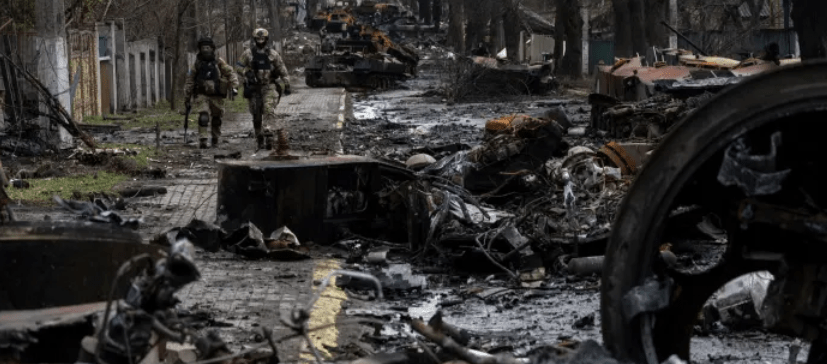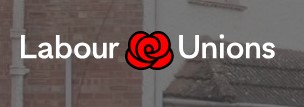By John Pickard
We have not commented on the progress of the war in Ukraine because most Left Horizons readers will have followed it for themselves. But we should not pass without comment the newspaper reports that have revealed atrocities committed by Russian forces against civilians in Ukraine.
Although it is always important to guard against an unthinking acceptance of those press reports that we are allowed to see, there is an overwhelming weight of photographic and other evidence to support the reports of civilians having been killed in some towns previously occupied by Russian forces, some shot execution-style with a bullet to the head, and others with their arms tied.
There can be no doubt about the gut feeling of all workers across the globe today, seeing the press reports coming out of Kyiv, and from the towns from which Russian troops have withdrawn. It is an appalling legacy for Putin, and one for which he will pay dearly in the long run, even if not immediately.
Russian media completely muzzled
The great pity is that the majority of Russian workers will not themselves see the reports, the Russian media having been so well muzzled in the last six weeks. The one remaining news outlet that had adopted an alternative view, Novaya Gazeta, was closed by its editors six days ago (March 28) after it had received a second warning from Roskomnadzor, the government service that supervises all communications, information technology and mass media.

It will take some time, through the grape-vine of returning service personnel and their families, before the true story of the Ukraine invasion begins to be disseminated among Russian workers, and it may not be fully revealed until Putin is overthrown.
It appears clear now that the original aims of the invasion were seriously blunted by the unexpected resistance of Ukrainian forces, particularly around Kyiv, and that this is the reason for the Russian withdrawal from the north. Pictures coming out of these areas have shown, apart from the bodies of murdered civilians, that there was a much higher toll taken on Russian military vehicles and tanks than had been assumed at first.
It is impossible to take seriously, therefore, Russian claims that they have achieved their objectives in the north and that it is for that reason that they are switching attention to the south. It is far more likely that Putin is cutting his losses around Kyiv and deploying more military resources in the south, to establish a land bridge to Crimea, which means occupying a large stretch of the coastline on the Black Sea, and also to consolidate and expand its control of the Donbas.

Putin’s aim in launching the invasion was to return Ukraine to the ‘sphere of influence’ of Russia. It was not a “special military operation” in the interests of Ukrainian workers in the Donbas, Russian-speakers or not, but a war for the interests and the prestige of the regime in the Kremlin. Russia may not be an global imperialist state with the economic and military reach of the USA, but Its invasion is an imperialist policy nonetheless, albeit one with limited ‘regional’ aims.
Collapse of USSR was a ‘national humiliation’
Those around Putin are rooted in the old security apparatus of the USSR, especially the KGB, more than in any other section of the old state. They have never forgiven Gorbachev and Yeltsin for the demise of the USSR in 1991 and for the subsequent collapse of Russian prestige.
They have seen Russia being obliged to seek loans from the IMF in the 1990s and a large-scale expansion of NATO and the EU into Eastern Europe, including into former constituent states of the USSR, all of which constitute in their mind a national humiliation. It is for this reason that Putin has drawn a red line over Ukraine, whose flirtation with membership of the EU and NATO were the real reason for the invasion.
Putin used the wealth amassed through oil and gas sales to prepare for the inevitable sanctions that would follow an invasion which was nevertheless a massive gamble. It now looks like a gamble that has not paid off, and from the point of view of shoring up support domestically, from this point on it might be a matter of damage limitation.
There were reports in the more sober capitalist press like the Financial Times, of disaffection among Russian soldiers. These were often reports that could not be independently verified, but they even included stories of Russian soldiers deliberately killing their own officers, reminiscent of similar acts of desperate disaffection among US troops during the Vietnam War.
According to one report in the Financial Times, (April 1), a unit of ‘national guards’ established primarily for internal social control, had even refused to be deployed in Ukraine. The FT reported that a Russian lawyer had claimed he would be defending some national guardsmen who had refuse to go. “A lot of people don’t want to go and fight,” he told the FT by telephone, adding that about a thousand people had been in touch with his legal team. According to the report, none of the guardsmen had been told why they were being sent to Ukraine, or about “the tasks and conditions of this operation” and as a result, “did not consent to it.”

“Some western analysts”, the Financial Times correspondent noted, “believe the guardsmen were likely sent to Ukraine not to act as frontline troops but to help occupy and put down protests in Ukrainian cities.”
Putin’s poll ratings have risen in Russia…for the time being
Control of the mass media, however, means that for the moment, it is likely that Putin will be able to ‘justify’ the hardships faced by Russian workers to pay for the war, and mitigate them where possible. Again according to the Financial Times (March 30), Putin’s poll ratings have risen. If it can be believed, the independent Levada polling organisation has his approval rating rising to 83 per cent, “marking a major increase in domestic support…since the outbreak of war”. This is an increase from the 69% and 71% reported in January and February. If sanctions were meant to undermine Putin, then clearly in the short term, they are not working.
Two days before it was obliged to cease publication, Novaya Gazeta reported that Putin was working hard to mitigate the effects of sanctions and to shore up support for his government. The economy is expected to contract by as much as 15 per cent as a result of the war and sanctions and without some additional government support, it will impact significantly on the lives of ordinary Russians.
Special measures were therefore introduced by the Russian government to benefit service personnel and their families, but there were also widespread changes to support living standards. A new law, Novaya Gazeta reported, “exempts from paying personal income tax on material benefits received in 2021-2022. The payment of personal income tax on interest income received on bank deposits in 2021-2022 is also cancelled”.

Among a raft of other measures, the Russian Prime Minister, Mikhail Mishustin, announced that the government was “working on increasing all social benefits, including benefits, pensions, salaries in the public sector, the cost of living and the minimum wage. Also in May, payments will begin for children from 8 to 16 years old in families with low incomes”
Putin will double down on his negotiating demands
Although there are allegedly face to face talks taking place between Russian and Ukrainian representatives, the chances of a peace agreement look slim. After risking so much on a gamble, and paying such a high price for it, Putin is likely to double down on his demand for Ukrainian recognition of Crimea as Russian, for autonomy for the Donbas and guarantees of Ukrainian neutrality. For their part, having resisted so well in the north and having the overwhelming support of Western Europe and the world (although still without direct NATO involvement), Zelensky will be in no hurry to agree Russian terms.
The war, therefore, is likely to drag on a lot longer yet. Russian is apparently calling for international ‘volunteers’ to fight on its side in Ukraine, and that might mean forces from Syria. We know from that experience that winning for the Assad regime meant turning most of the contested towns and cities into rubble. Meanwhile, the cost to Ukrainian workers in terms of the loss of life and the horrendous humanitarian crisis goes on.
Even now, despite the atrocities that have been committed, we should not join in the hypocritical chorus of Western governments, or their tame media outlets. Let us not forget that the US and British governments are persecuting Julian Assange precisely because he exposed war crimes committed by US forces against civilians in Iraq. France’s President Macron has called for a ban on Russian and coal and gas imports over these war crimes: the same man who is silent on the role played by French service personnel during the genocide in Rwanda.
We condemn the atrocities committed in Ukraine on our own terms, as workers and socialists. It is always the working class that pays the price of war, and the news coming out of Ukraine now is the most stark and horrific evidence of that fact.



